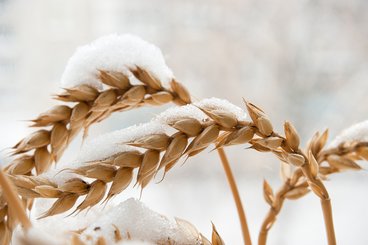
BBE scientists are partnering with a global team to study the complex effects of climate change on winter crops.
Warming winters may sound like a welcome change for some farmers because the change in temperature could reduce freezing stress on plants and create more ideal conditions for growing overwinter cash crops and winter cover crops. However, when looking at climate change from a cross-seasonal perspective and accounting for declining snowpack, researchers are finding that the whole picture isn’t so sunny.
Reduced snow may result in more exposure of winter crops to freeze and could mean greater risks for agricultural drought.
In a new study published in Nature Climate Change, Zhenong Jin, Ph.D., an assistant professor in the Department of Bioproducts and Biosystems Engineering at the University of Minnesota, led an international team in researching the implications that could be associated with warmer winters and declining snowpack, using winter wheat (the largest winter crop in the U.S.) as an example.
“Although the implications of changes in snow for agricultural irrigation are beginning to be understood, the consequences of such for predominantly rainfed winter crops such as winter wheat remain largely unknown. There might be risks for being overoptimistic about growing overwinter crops under climate change,” said Jin. Continue here to read the full story.